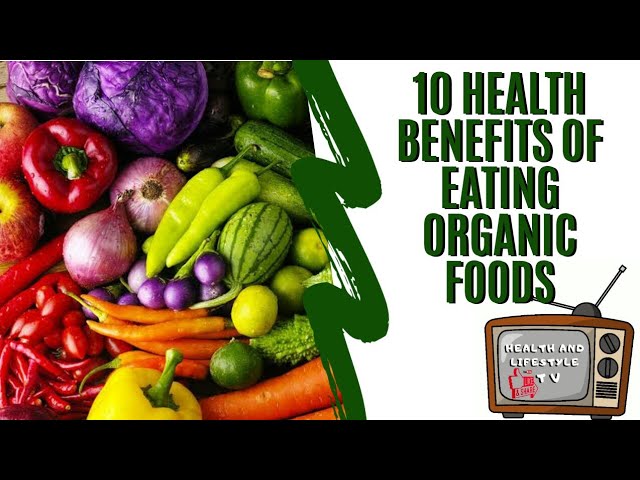10 Benefits of Organic Food
Welcome to our comprehensive guide on the 10 benefits of organic food. In this article, we will explore the numerous advantages of consuming organic food and how it can contribute to a healthier lifestyle. Organic food has gained significant popularity in recent years due to its positive impact on both our well-being and the environment. Let’s dive in and discover the remarkable benefits that organic food offers.
Nutritional Value
Organic food is known to have higher nutritional value compared to conventionally grown produce. Studies have shown that organic fruits and vegetables contain more vitamins, minerals, and antioxidants. This is because organic farming practices prioritize soil health, which leads to nutrient-rich crops.
No Harmful Chemicals
One of the key advantages of organic food is that it is produced without the use of harmful chemicals such as synthetic pesticides, herbicides, and fertilizers. By choosing organic, you can minimize your exposure to these potentially toxic substances, which can have long-term negative effects on human health.
Environmental Benefits
Organic farming practices promote sustainability and protect the environment. Unlike conventional farming, organic methods do not rely on synthetic chemicals that can harm soil, water, and wildlife. Organic farms also prioritize biodiversity and conservation, contributing to a healthier ecosystem.
Better Taste
Organic food often offers a superior taste compared to conventionally grown produce. The natural and organic farming methods allow the crops to develop their full flavor potential. Whether it’s juicy organic fruits or vibrant vegetables, the taste of organic food is often more pronounced and enjoyable.
GMO-Free
Genetically modified organisms (GMOs) are not allowed in organic food production. This means that organic food is free from genetically engineered ingredients, providing peace of mind for those who prefer to avoid GMOs. By choosing organic, you support sustainable and natural farming practices.
Supports Local Farmers
Buying organic food supports local farmers who follow organic practices. By choosing organic, you contribute to the growth of sustainable agriculture and help small-scale farmers thrive. This not only benefits the local economy but also encourages the preservation of traditional farming methods.
Reduced Antibiotic Resistance
In organic livestock farming, the use of antibiotics is strictly regulated. This helps combat the growing concern of antibiotic resistance, which can have severe consequences on public health. By consuming organic meat and dairy products, you can minimize your exposure to antibiotics and support animal welfare.
Enhanced Animal Welfare
Organic farming practices prioritize animal welfare. Livestock raised organically are provided with spacious living conditions, access to the outdoors, and a natural diet. This ensures that the animals are treated with respect and care, resulting in higher-quality meat, eggs, and dairy products.
Preserves Soil Health
Organic farming methods prioritize soil health and fertility. By avoiding synthetic chemicals and promoting natural soil management techniques, organic farmers help preserve the integrity of the soil. This leads to improved soil structure, increased water retention, and reduced erosion, ensuring sustainable agricultural practices for future generations.
Long-Term Health Benefits
Consuming organic food can have long-term health benefits. By avoiding the intake of harmful chemicals and consuming nutrient-dense organic produce, you can reduce the risk of certain diseases and promote overall well-being. Organic food is an investment in your health and the health of the planet.

In conclusion, organic food offers a myriad of benefits ranging from higher nutritional value to environmental sustainability. By choosing organic, you support your health, local farmers, and the planet. It’s time to embrace the advantages of organic food and make a positive impact on your well-being and the world around you.
Frequently Asked Questions about the Benefits of Organic Food
1. What are the benefits of organic food?
Organic food offers various benefits such as reduced exposure to pesticides, higher nutrient content, improved taste, and better environmental sustainability.
2. Is organic food more nutritious than conventional food?
Yes, organic food is often more nutritious as it contains higher levels of vitamins, minerals, and antioxidants compared to conventionally grown food.
3. Does organic food help in reducing the risk of diseases?
Research suggests that consuming organic food may help in reducing the risk of certain diseases such as cancer, heart disease, and neurodegenerative disorders.
4. Does organic farming protect the environment?
Yes, organic farming practices promote soil and water conservation, reduce pollution, and preserve biodiversity, making it more environmentally friendly compared to conventional farming.
5. Can organic food help in supporting local farmers?
By choosing organic food, you can support local farmers who follow organic farming practices, contributing to the sustainability of local agricultural communities.
6. Is organic food free from genetically modified organisms (GMOs)?
Organic food is produced without the use of GMOs, ensuring that it is free from genetically engineered ingredients.
7. Does organic food taste better?
Many people believe that organic food tastes better as it is often fresher, grown in healthier soil, and free from synthetic additives that can affect flavor.
8. Can organic farming help in reducing water contamination?
Organic farming practices, such as avoiding synthetic pesticides and fertilizers, can help in reducing water contamination, leading to improved water quality.
9. Is organic food more expensive?
Organic food can be slightly more expensive due to the higher costs associated with organic farming practices, but the long-term health benefits outweigh the price difference.
10. Are organic food products labeled accordingly?
Yes, organic food products are labeled with certifications like USDA Organic or EU Organic, ensuring that they meet specific organic standards set by regulatory bodies.




